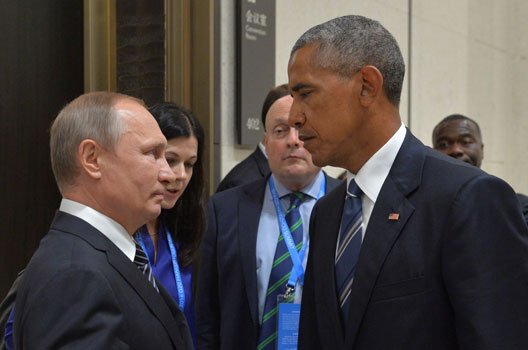 Rex Tillerson’s confirmation hearing on January 11 put a spotlight on an eventual architect of the next US administration’s Russia policy. Although he holds deep international experience, Tillerson is a highly controversial selection for the job of secretary of state. He has a track record of opposing sanctions on Russia and calling for increased cooperation with Moscow despite Russia’s destabilizing activities around the world. His comments at his confirmation hearing before the Senate Foreign Relations Committee generally reinforced the assumption that US President-elect Donald Trump’s administration is heading toward its own “reset” with Moscow.
Rex Tillerson’s confirmation hearing on January 11 put a spotlight on an eventual architect of the next US administration’s Russia policy. Although he holds deep international experience, Tillerson is a highly controversial selection for the job of secretary of state. He has a track record of opposing sanctions on Russia and calling for increased cooperation with Moscow despite Russia’s destabilizing activities around the world. His comments at his confirmation hearing before the Senate Foreign Relations Committee generally reinforced the assumption that US President-elect Donald Trump’s administration is heading toward its own “reset” with Moscow.
Although Tillerson objected to recent Russian actions, he largely demurred to questions on whether it was important to continue sanctions on Russia and stressed the need to work with Russia on areas of mutual interest such as fighting terrorism. His unwillingness to describe Russia as a threat, instead calling it a danger, is unfortunate and showcases a more accommodating position on Russia in the next administration.
Despite the expected tone of Tillerson’s testimony, he did make important statements that he should be accountable for as we judge the Trump administration’s attempts to contrast itself with the Obama administration and its Russia policy. Tillerson correctly stated that the US response to Russia’s invasion of Ukraine in 2014 was inadequate and stated “the absence of a firm and forceful response to Crimea was judged by Russia to be weak.” He also surprised many, noting that the United States should have responded by helping Ukraine defend itself and “providing Ukraine with defensive weapons.” Correcting these past imbalances will be critical to deterring Moscow from future destabilizing actions and ensuring that Russia does not again gain the impression that it can invade its neighbors with impunity.
Russia’s actions in its neighborhood and cyberattacks in the United States during the 2016 presidential election are among the most critical challenges facing the United States. Russia is a threat to US national security interests and has shown time and again a clear willingness to subvert our democratic process, destabilize our allies and partners, and erode US efforts to serve as a global leader. Russia’s continued occupation of Crimea, destabilization of eastern Ukraine, support for Bashar al-Assad’s regime in Syria, and unbridled use of cyber warfare both throughout Europe and in the United States should serve as a litmus test of Russian President Vladimir Putin’s willingness to work with the United States.
Trump will likely meet Putin this year. Although the president-elect has provided conflicting signals on a range of international issues, he has remained consistent on his approach to Russia and has refused to recognize Russia’s destabilizing actions in the United States and abroad. On January 11, at his first press conference since winning the election on November 8, Trump said he now believes Russia was likely behind the cyberattacks in the United States. This step is long overdue. It should be followed by a commitment to investigate Russian subversion in the 2016 presidential election and actions that deter Moscow from future destabilizing actions.
The Trump administration would be well served to strengthen its hand in any upcoming diplomacy with Putin by taking three important steps.
First, expand on the deterrence measures employed over the past two years by bolstering US presence, to include permanent presence, in Eastern Europe and enhancing both the scope and lethality of defensive assistance to our allies and partners. This will help our allies and partners at a time of real threat to their security and highlight the costs associated with destabilizing Europe. Second, the United States should strengthen and, where necessary, expand the sanctions regime against Russia. Elements in the bipartisan legislation introduced this week in Congress that address responding to Russia’s subversion of the US election process are the best place to start. Third, Trump and his team should be cautious in their stated intent to find areas of common interest as the bedrock of strengthened US-Russian ties. In Syria, Russia has refused to commit any significant effort to counter the Islamic State of Iraq and al-Sham (ISIS), it is opposed to reopening negotiations over Iran’s nuclear program, and will resist efforts to place additional pressure on China—all stated policy priorities of a Trump administration.
Many US presidents have come into office seeking a better relationship with Russia based on cooperation on shared interests; a similar number have left office with their hopes dashed by a clear contrast of interests on a range of issues. Building a more productive relationship with Russia will start with ensuring that the Kremlin understands that the United States will continue to protect its democracy at home, support its allies and partners abroad, and be guided by the underlying vision of adhering to US interests and values as it pursues positive relations in Moscow where appropriate.
Mark Simakovsky is a nonresident senior fellow in the Atlantic Council’s Dinu Patriciu Eurasia Center and served as the Russia country director and Europe/NATO chief of staff in the Office of the Secretary of Defense for Policy.
Image: Russian President Vladimir Putin meets with President Obama on the sidelines of the G20 Summit in Hangzhou, China, September 2016. (Sputnik/Kremlin/Alexei Druzhinin/via Reuters)
